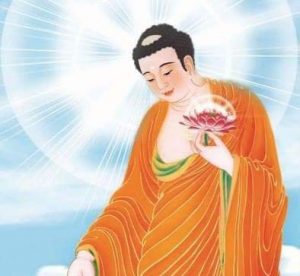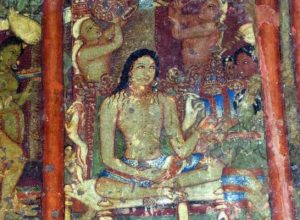
Faith through devotion is not necessarily the result of the root of wisdom
One must have previously cultivated deep roots of virtue in past lives in order to believe in the teachings of Pure Land Buddhism upon first hearing them. With respect to the roots of virtue, the root of wisdom and the root of faith are interrelated and interdependent, thus faith through interpretation (resulting from the root of wisdom) and faith through devotion are both acceptable as the initial step through the door of the Pure Land, the most difficult-to-believe-in Buddhist teaching.
In the Amitabha Sutra, Shakyamuni Buddha selected Shariputra to act as interlocutor, calling his name 38 times to draw the attention of the audience. This is because Shariputra was the wisest of all Shakyamuni’s disciples, and thus his roots of virtue—particularly the root of faith—were deep enough for him to believe in the teaching of the Pure Land.
However, many people think that the root of faith grows deep through the influence of the other roots of virtue. In this way of thinking, deep faith is the result of deeper wisdom and so on. In fact, the root of faith can be nourished on its own by “receiving” the Buddha’s merits and virtues through Buddha-mindfulness (or Amitabha-recitation in Pure Land Buddhism).
The Dharmadhatukaya of all Buddhas share three characteristics
In the Contemplation Sutra, Shakyamuni Buddha says in the Eighth Contemplation: “Every Buddha Tathagata possesses a spiritual body (Skt. Dharmadhatukaya) so that he may enter into the mind of any being who thinks of him. Consequently, when you have perceived the Buddha, it is indeed your own mind that possesses the thirty-two signs of perfection and eighty minor marks of excellence that you see in the Buddha. In conclusion, when you are mindful of the Buddha, your mind becomes the Buddha’s mind. The ocean of true and universal knowledge of all the Buddhas derives its source from one’s own mind and thought.”
Master Shandao explains this paragraph as follows: “Dharmadhatukaya is so called because it contains three meanings: the Buddha’s mind is omnipresent, the Buddha’s body is omnipresent, and the Buddha’s body is totally unobstructed.”
When Shakyamuni Buddha introduces Amitabha’s Dharmadhatukaya, he says: “Amitabha Buddha possesses eighty-four thousand signs of perfection; each sign is possessed of eighty-four minor marks of excellence, and each mark has eighty-four thousand rays. Each ray extends so far as to shine over the worlds of the Ten Directions, whereby the Buddha embraces and protects—without excluding or forsaking—those beings who think of him.”
Master Shandao explains this paragraph as follows: “There are three meanings:
1. Intimate relationship. Amitabha’s mind is intimate with all reciters of his name because the Buddha’s mind is omnipresent. When the practitioner prostrates, recites, and thinks of him, Amitabha sees, hears, and knows it immediately.
2. Close relationship. Amitabha’s body is close to all reciters of his name because his body is omnipresent. When the practitioner aspires to see him, Amitabha will appear before him immediately.
3. Augmentative cause. Sentient beings who recite Amitabha’s name will immediately clear the negative acts of many kalpas. When they die, Amitabha, along with a multitude of sages, will naturally appear to welcome them. This cannot be impeded by any negative karma [obstructing them from being reborn in the Land of Bliss]. Therefore [recitation] is known as an augmentative cause because Amitabha’s body—in the form of light—is unobstructed.”
Amitabha’s body in the form of light, the power of his Vow,* and his name are all one entity
Amitabha Buddha is also known as “Amitabha Buddha with the Body Storing All Virtues of the Dharmadhatu.” This means that all his merit and virtue, including those of the Five Precepts and Ten Wholesome Deeds, of Shravakas (those who heard Shakyamuni’s teachings originally), of Pratyekabuddhas (solitary realizers), of the small sages of the Three Benevolences,** of the great sages of the Ten Directions, and of all Buddhas, are stored in Amitabha’s Dharmadhatukaya. This is why he is called “Amitabha Buddha with the Body Storing All Virtues of the Dharmadhatu.”
Name-recitation can elicit the merits and virtues of the Buddha naturally because the Buddha’s name and the Buddha’s virtues are one entity, interchangeable, and inseparable. It is like switching on a light: the room will be illuminated as a matter of course; any other outcome would be unnatural. We merely recite the Buddha’s name and we naturally acquire the Buddha’s virtues within us. The Buddha’s virtues naturally become our own.
Whether or not we know or believe it, recitation of Amitabha’s name means Amitabha enters our minds in the form of light, which carries all his splendid merits and virtues. These virtues nourish our roots of virtue and transform the “seeds” in our Alaya (or Storehouse) Consciousness from those of an ordinary being to those of a sage, enabling us to be reborn in the Land of Bliss. This is why Amitabha-recitation nourishes our root of faith. Amitabha-recitation is also known as the practice of “Other Power” because all benefits and rewards are the result of Amitabha’s merits and virtues and not those of the practitioner.
Amitabha’s Vow-power and name are also one entity, but different in expression. Faith in the power of his Vow is the same as faith in his name. Faith in his name means faith in the practice of Amitabha-recitation. So Amitabha’s name, faith, and Amitabha-recitation are also one entity, but different in expression.
Amitabha’s name (tangible teachings) is faith (intangible ideals), and faith is Amitabha-recitation (tangible practice). So, there is no need for the practitioner to seek faith when he already exclusively practices lifelong Amitabha-recitation.
* In Chapter on the Easy Path, the bodhisattva Nagarjuna emphasizes this core teaching of Pure Land Buddhism, saying, “Amitabha’s Fundamental Vow is as follows: If anyone invokes me, recites my name, and takes Refuge in me, he will instantly enter the state of assurance [non-retrogression], and subsequently attain the highest perfect enlightenment. For that reason, you should always be mindful of him.”
** Bodhisattvas of the 11th–40th stage; the Ten Dwellings, the Ten Practices, and the Ten Merit-Transferences.













